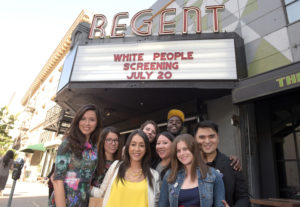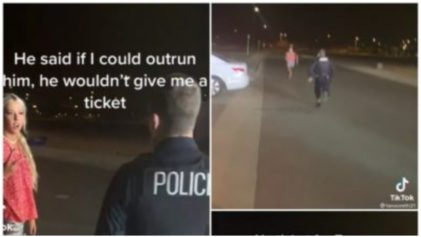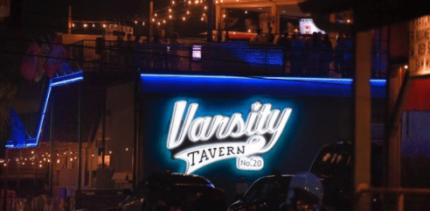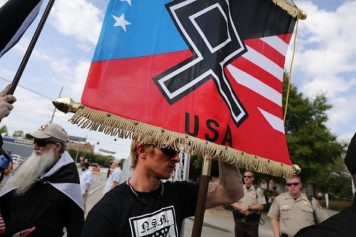
LOS ANGELES, CA – JULY 20: Jose Antonio Vargas (Far Right) attends a screening of “White People” at the Regent Theater on July 20, 2015 in Los Angeles, California. (Photo by Jason Kempin/Getty Images for MTV Networks)
MTV’s new documentary, White People, provides an insightful look into the issue of race from the attitudes of white millennials. And in what would not be a surprise to Black viewers, many young white people do not have a clue when it comes to racism.
White People is the creation of Jose Antonio Vargas, a Filipino Pulitzer Prize-winning journalist and undocumented immigrant who travels around the country and speaks with five white young people. He does what is rarely done, which is have a discussion with whites on whiteness—white identity and what it means to be white. The 41-minute film is a part of MTV’s Look Different campaign—which wants to “illuminate biases on the basis of race, gender, and sexual orientation”—and Vargas’ nonprofit organization Define America.
“As the title suggests, the documentary is about exploring whiteness, but it’s not the film that you think it is. It doesn’t bash the white race—instead, it includes them in a conversation that they are often left out of,” Vargas said in an interview with ET. “The film adds to the ongoing dialogue about race, immigration and diversity in America that is in apparent in all of his work.”
The topic of racism is one that does not come easily for white folks, in a nation that does not do well in confronting or dealing with hard questions regarding race. Often, whiteness is the standard in America, and whites never have to scrutinize themselves due to their race. They do not have to concern themselves with how others perceive them for their whiteness. Security guards do not follow whites around in the department store. No racial profiling from police, no white version of Sandra Bland, Michael Brown or Tamir Rice. White is the default setting, the “normal” condition by which everyone is judged.
“Again, one of the things White People touches on is that whiteness should not be the norm—it shouldn’t be the standard,” Vargas told ET. “I’m not saying that to be disrespectful or rude. I’m saying that America was never white. The world was never white. The fact that Hollywood doesn’t reflect what America looks like doesn’t just hurt Hollywood—it hurts all of us.”
Vargas’ task was to have white people come face-to-face with the destructive nature of racism, and force them to deal with their racial misperceptions in light of the facts. For example, Katy, one of the white millennials featured in White People, blamed racial discrimination for her inability to receive a college scholarship. Vargas presented her with cold hard statistics which show 96 percent of scholarships are available to whites, who are 40 percent more likely to receive them than are Black and brown people. The real issue is not whites being excluded from scholarships, but rather tough economic times and higher competition for funding for college. Katy had a change of heart.
“I didn’t make this film so I can talk to white progressives and people of color who are progressives and pat ourselves on the back and say ‘oh, look what we did.’ That’s not the goal,” Vargas told the Washington Post, in a report from Soraya Nadia McDonald. “As a filmmaker and a journalist my goal is how do I create this conversation and how do I create a space where people can actually see each other better? That’s my goal.”
Further, as Bruce Goodwin noted in The Urban Daily, the documentary reveals that most whites view themselves as colorblind, “while some believe that idea to be dismissive and a cop out. We then see a white privilege workshop in a classroom full of white males that is even taught by a young white kid,” Goodwin writes of the documentary. “Rather than discussing the issues that are associated with the privilege, it’s more about how the attendees feel. It’s a discussion with seemingly no means to an end.”
People of color are agents in this film, including a young Black woman in North Carolina who breaks down and leaves the room when a group of her white counterparts begin to use the term “ghetto,” a word that causes pain for some Black people because of its use as a racial slur to denigrate them.
“When someone on camera looking at you directly says, ‘As a white person, you kind of get this feeling that things belong to you,’ and, ‘Well, you never have to internalize what white people have done in America, and here you can’t escape that.’ Just those two comments alone have warranted very unprintable emails,” Vargas told Vulture. “People are saying that I’m making them feel guilty. I’m like, ‘I’m not.’ I’m sure there are progressive, liberal people who are going to watch this thing and they’re going to go, ‘Oh, you should’ve been harder on people.’ Some people on the right are going to say, ‘He’s too hard,’ or ‘He’s making us feel guilty or ashamed of who we are.’”
White People comes at a seminal moment in time, when whites are gradually emerging as a minority group, as Black people are challenging white supremacy and skin privilege, and railing against institutional racism. Ferguson, the massacre at Emanuel AME Church in Charleston, the death of Sandra Bland and other events are forcing Americans to deal with racism and the stark realities of racial disproportionality in the criminal justice system. While Black people are tired of talk and demanding action, white folks have an opportunity to confront the systems of white supremacy they perpetuate.
“We’ve never had to internalize what white people have done in America,” said Samantha, a white woman in the film who teaches at a school on a Native American reservation, where whites are called “wasichu,” which means “he who takes the best meat” in Lakota. “Here, you can’t escape that.”
White obliviousness on racism abounds. A Huffpost/YouGov poll found that while three-quarters of white Americans say racism is at least a “somewhat serious” problem, nearly nine out of 10 Black people agree. Moreover, 68 percent of Blacks believe it is a “very serious” problem versus 31 percent of whites.
Most whites surveyed also said racism is not a factor in their lives and they are not empowered to act. Further, a 2014 MTV study found that the majority of millennials are not post-racial, putting their heads in the sand on issues of diversity and racism. Meanwhile, as Vargas noted, most white Americans live in a white bubble, in communities that are 77 white, with the average white person having a group of friends that is 91 percent white.
Far too often, America’s race problem is presented from the standpoint of the perceived shortcomings, hangups, pathologies of Blacks and other people of a darker hue, as if we are the ones who need to change. But as this documentary suggests, white people are indeed the problem.
White People debuted on MTV on July 22, and is also available online on MTV.com, YouTube, MTV’s Facebook page, as well as iTunes and other services.


